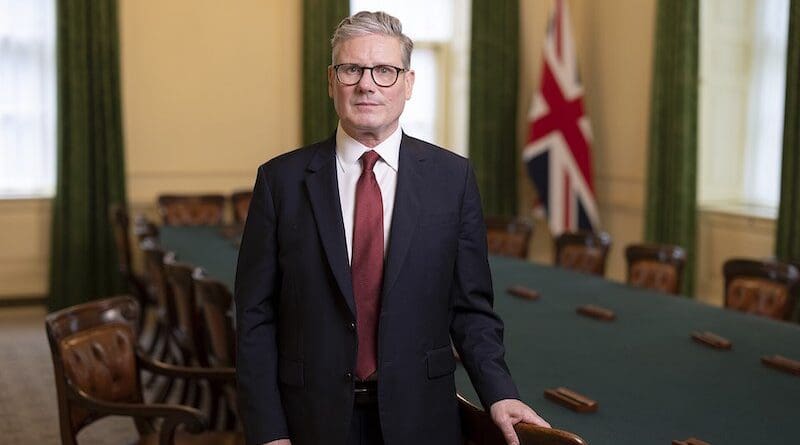UK
Labour Government: The Politics Of Service – OpEd

UK Prime Minister Sir Keir Starmer. Photo Credit: Official Portrait, Wikimedia Commons
After 14 years of Conservative incompetence, corruption and lies, the election of The Labour Party led by Kier Starmer, has ignited a feeling of hope and optimism in the country.
In a historic election, on 4 July Labour won a landslide with 412 parliamentary seats (of 650 in total); the Tories, as if anyone cares, recorded there worst ever election result, and have at last been consigned to the political wilderness to tear themselves apart.
The new intake of MPs constitutes the most ethnically diverse and gender balanced parliament in history, with women making up 40% of all MPs. It also has the largest number of LGBTQ+ MPS ever, with Labour’s 50 LGBTQ+ MPs representing the largest party cohort of any parliament, anywhere in the world.
Labours extraordinary triumph demonstrates that in the age of extremism, a left of centre party can still win power, something that is encouraging for countries in Europe and the US. Populism in the UK, strengthened by the Brexit referendum and relentlessly fuelled by the Conservatives, however has not been driven out of British politics. Reform UK, a new far right company (not a political party), that promotes intolerance, hate and division, won 5 parliamentary seats and came second in 103 constituencies.
Like all such groups they have no workable policies, blame everything on immigrants and migration, talk dismissively about climate change and net zero, and are a poisonous, dangerous force in the country. These xenophobic parties prosper where inequality, economic insecurity and social injustice exist. The antidote is to deal with these underlying causes, to build inclusive fair societies and to challenge divisive intolerant rhetoric wherever it emerges. If Labour can do this the country will be a more harmonious united place, and Reform’s support will quickly fall away.
Labours inheritance
The Conservatives ran the country into the ground, and created what the Lisa Nandy, the new Secretary of State for Culture, described as “the darkest decade and a half in my lifetime.” They divided the country, destroyed public services, including the NHS, which the new Secretary of State for Health described as ‘broken’, increased inequality and child poverty, saw homelessness explode, tanked the economy and, with their total disregard for the rule of law, undermined the UK’s position in the World. In addition they caused the Brexit disaster and, among other calamities, are responsible for countless avoidabledeaths during Covid.
The task before the new government is therefore huge, but the team is strong and their commitment to “a calm and patient rebuilding” appears genuine. Repairing the damage done and creating a sense of optimism, where for so long there has been despair, will not be easy and will take time, something governments tend not to have much of. Unity is key; if Labour can bring about a degree of social justice and reduce economic hardship, if it restores the NHS and decentralises political decision making to the nations and regions, it may have a chance of squashing the forces of division and generating a feeling of national togetherness.
Labour’s one word campaign slogan was ‘change’, and, after a matter of days in office, the single biggest change has been in tone. Gone is the infighting, the pettiness and duplicity, to be replaced with committed determination, openness and competency. As The Guardian put it, “The grownups are back in Westminster. The Tory psychodramas inside No 10 have been replaced by a serious Labour government focused on delivery.”
In his first speech at Prime-Minister Keir Starmer delivered a message of hope and sincerity. He promised to build a “government of service” and to restore trust in politics, by ‘actions not words’. To put the “country first” not the party, and to govern “unburdened by doctrine”. Politics, which for so long has not served the country, he said, “can [indeed should] be a force for good”.
Starmer’s initial decisions have been consistent with Labour’s commitment to ‘change and stability’; terms that may appear contradictory, but as Labour voices have repeatedly pointed out, after 14 years of chaos and pettiness, stable thoughtful government is change. Most of the shadow team were appointed to the cabinet, which contains more female ministers than any previous government, and includes Rachel Reeves, the first ever female chancellor. It is also the most working class cabinet – the majority of the top team went to comprehensive schools, with only one member of the cabinet attending private school, compared with 75% in Conservative cabinets over recent years.
All of which is significant, and means that unlike successive Tory administrations, which we’re overflowing with millionaires and privilege, the people now engaged in fashioning policies, and putting forward legislation, will have a real understanding of the lives most people are living.
Politicians routinely talk about their desire to unite a country, and Labour have said that cultivating unity is a main priority for them. In his first speech as PM, Starmer said this, “You have given us a clear mandate and we will use it to deliver change. To restore service and respect to politics, end the era of noisy performance, tread more lightly on your lives. And to unite our country, four nations standing together again.”
One way they hope to “unite the country” is by chipping away at inequality, by moving decision making closer to people is key to this; working with regional mayors and leaders, decentralising power and establishing cooperative relationships. “Putting people in charge of their own destiny”, Lisa Nandy says, is the “silver thread connecting all areas of the new government.”
Whilst many of us would like to see Labour go much further than it has so far pledged to do, particularly in relation to Europe and the environment, after years of duplicity and incompetence it feels like Britain has turned a corner and that the work of re-building and healing, so desperately needed, has begun.
MastodonLinkedInShare

Graham Peebles
Graham Peebles is an independent writer and charity worker. He set up The Create Trust in 2005 and has run education projects in India, Sri Lanka and Ethiopia where he lived for two years working with acutely disadvantaged children and conducting teacher training programmes. Website: https://grahampeebles.org/
No comments:
Post a Comment